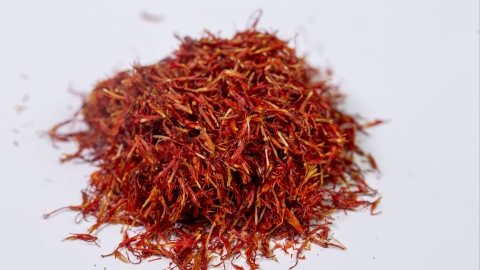What are the benefits and effects of drinking saffron tea?
Generally, the main effects and benefits of drinking saffron tea include promoting blood circulation and meridian function, relieving depression and calming the mind, improving circulation, easing emotions, and assisting in body regulation. Detailed explanations are as follows:
1. Promoting Blood Circulation and Meridian Function
Saffron contains active ingredients such as crocin. When steeped in water, these components dissolve and can promote blood and qi circulation in the body. For conditions such as limb soreness and stiffness of the meridians caused by poor circulation of blood and qi, moderate consumption can help unblock the meridians, improve local blood and qi supply, and alleviate discomfort, especially suitable for people experiencing physical stiffness after prolonged sitting.

2. Relieving Depression and Calming the Mind
When saffron is steeped in water, its beneficial components act on the nervous system. For symptoms such as irritability, mood swings, and insomnia with vivid dreams caused by work stress and mental tension, moderate consumption can help soothe the nerves, stabilize emotions, improve sleep quality, and promote a calmer mental state.
3. Improving Circulation
Drinking saffron tea can assist in dilating blood vessels and enhancing blood flow. For conditions such as dull complexion and cold hands and feet caused by poor circulation, moderate consumption can promote the delivery of oxygen and nutrients throughout the body, maintain normal metabolic functions, and make the body feel lighter and more energetic.
4. Easing Emotions
When saffron is steeped in water, its components are more easily absorbed by the body and can help regulate emotional states. For emotional tension and anxiety caused by daily stress and external pressures, moderate consumption may relieve feelings of tightness, gradually calm emotions, and provide a sense of relaxation.
5. Supporting Body Regulation
In traditional applications, saffron tea has been used to support body regulation. For mild functional disturbances caused by irregular作息 (作息 refers to rest and activity patterns) and unbalanced diets, moderate consumption may provide some support. However, it should not be considered a substitute for medical treatment. If significant physical discomfort occurs, professional medical advice should be sought.
When consuming saffron tea, each serving should be limited to 1-3 grams, as excessive amounts may cause gastrointestinal discomfort. Saffron is contraindicated for pregnant women and individuals with bleeding disorders, and should be used cautiously by individuals with hyperthyroidism or hypothyroidism. If nausea, diarrhea, or other abnormal reactions occur after consumption, discontinue use immediately and consult a healthcare professional.







